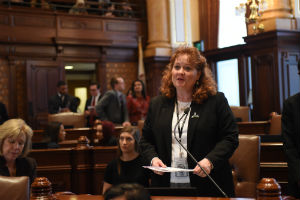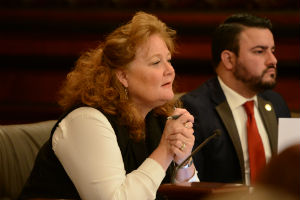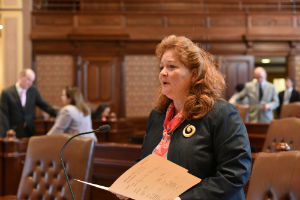Murphy recognizes Xenophon Doudalis on being awarded France’s highest honor for military service
- Details
 Last week, State Senator Laura Murphy (D-Des Plaines) congratulated Xenophon Doudalis on being awarded the French National Order of the Legion of Honour for his services in the U.S. Army during World War II.
Last week, State Senator Laura Murphy (D-Des Plaines) congratulated Xenophon Doudalis on being awarded the French National Order of the Legion of Honour for his services in the U.S. Army during World War II.
The Consul General of France in Chicago awarded Doudalis the highest French government order recognizing military and civilian merit during a ceremony at Des Plaines City Hall.
“Sergeant Doudalis’ courage, sacrifice and devotion to duty played a significant role in the defeat of the German Army in France during World War II,” Murphy said. “I am truly honored to serve as his State Senator and I thank him for the personal sacrifices he has made to preserve our freedom at home and to keep us safe.”
Doudalis, a resident of Des Plaines since 1962, served in the U.S. Army during World War II from August 1943 until March 1946 as an engineer and helped construct bridges so that American tanks under the direction of General Patton could cross into Germany.
While serving in the 281st Engineer Battalion, Doudalis’ unit helped liberate French cities and villages between Le Havre and Filstroff. He was one of the first American soldiers to enter the Dachau concentration camp in 1945 to liberate its prisoners.
During his time in the Army, Doudalis rose to the rank of Sergeant and was awarded two Overseas Service Bars, the Expert Rifle Medal, the Good Conduct Medal, the America Theatre Service Medal and the European African Middle Eastern Theatre Medal.
Murphy thanked Doudalis and expressed her gratitude for his service. She presented him with a Senate certificate of recognition.
Summer town hall presentation
- Details
 If you were unable to make it to one of my summer town hall meetings, please see the presentation by Ralph Martire below for more information on resolving Illinois' pension crisis. Ralph Martire is the executive director of the Center for Tax and Budget Accountability.
If you were unable to make it to one of my summer town hall meetings, please see the presentation by Ralph Martire below for more information on resolving Illinois' pension crisis. Ralph Martire is the executive director of the Center for Tax and Budget Accountability.
Murphy protects middle class, prevents property tax increase in budget
- Details
 SPRINGFIELD — State Senator Laura Murphy, a Des Plaines Democrat, today supported a bipartisan balanced budget plan that supports local communities and prevents a backdoor property tax increase.
SPRINGFIELD — State Senator Laura Murphy, a Des Plaines Democrat, today supported a bipartisan balanced budget plan that supports local communities and prevents a backdoor property tax increase.
“It was imperative to me that we did not shift massive pension costs onto local school districts and create a backdoor property tax increase as the governor proposed,” Murphy said.
“Shifting pension costs onto school districts would have undermined the new evidence-based school funding formula and forced many local communities to raise taxes. That was not something I could stand for.”
The governor’s proposed budget sought to push nearly $500 million in normal pension costs onto school districts this year.
The plan also includes $25 million for a new pilot grant program for Illinois undergraduate middle class students who choose to pursue higher education in the state. Through the AIM HIGH grant, the state would provide matching funding to public universities that award scholarships to Illinois students for both merit and financial need.
“Illinois has a serious problem with students leaving the state once they finish high school to pursue their college education elsewhere,” Murphy said.
“Many of them never return, representing an enormous brain drain with significant financial implications. I hope this new program will encourage more students to attend college in state.”
In addition to the AIM HIGH program, the budget includes nearly $60 million in additional funding to support Illinois colleges and universities over last year’s funding level.
The budget package now moves to the House for consideration.
Murphy measure supports cancer patients
- Details
 State Senator Laura Murphy (D-Des Plaines) advanced a measure to help cancer patients have children – a prospect that can diminish greatly for some patients once treatment begins.
State Senator Laura Murphy (D-Des Plaines) advanced a measure to help cancer patients have children – a prospect that can diminish greatly for some patients once treatment begins.
“Cancer patients deserve a chance to have children,” Murphy said. “For some men and women, fertility preservation prior to radiation or surgery is their only way to have biological children.”
House Bill 2617 requires insurers to cover standard fertility preservation services when a necessary medical procedure, such as radiation, chemotherapy and surgery, could cause infertility.
The Affordable Care Act provides infertility coverage but does not include fertility preservation services. Additionally, employers with 25 or more full-time employees who provide pregnancy-related benefits are required to provide coverage for infertility treatment, though some restrictions apply.
This measure attempts to address a patient’s desire to have children before they undergo a medical procedure that could render them infertile.
“I can only imagine the pain that newly diagnosed patients experience when they find out the procedure that could save their life may also prevent them from bringing a new life into the world,” Murphy said.
“Paying for fertility preservation out of pocket is burdensome and simply not possible for many patients. This legislation would remove that barrier.”
More Articles …
Page 106 of 137








